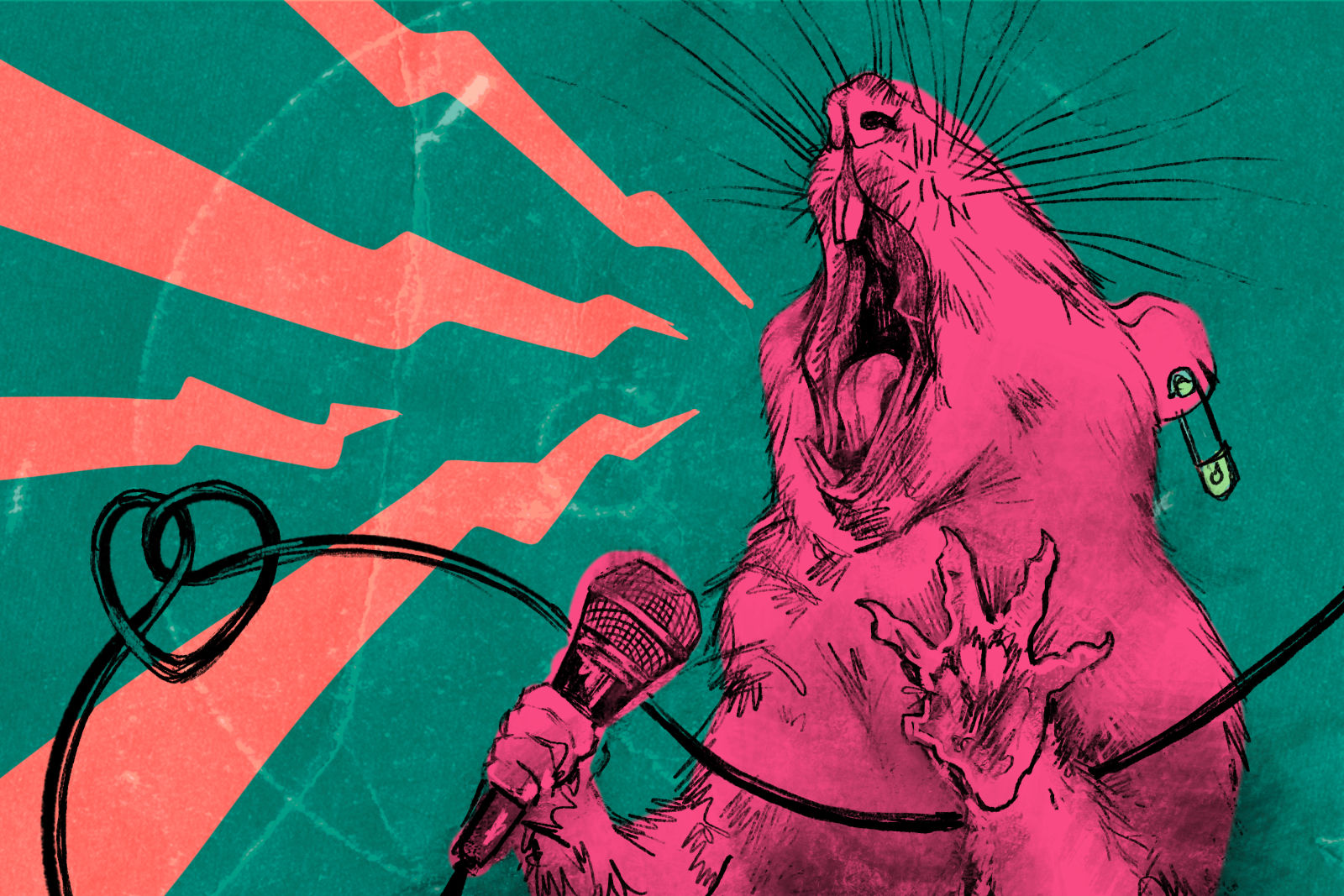In the year following my bipolar diagnosis, I was in the throes of its depression, a desperate gloom so profound I thought I would never, ever write another word. I stepped off the music journalism treadmill, likely forever, I thought. After 30 years writing about my favourite punk and metal bands, I no longer saw the point.
I flailed, wordless, for months. My counsellor recommended journalling, so I slopped some muck onto the first page of a dollar-store journal, put it away, and went back to my thought-spiral of hopelessness.
In October 2018, I was sent home from the hospital with a mittful of meds, still riding high on a manic episode, and chicken-scratched the words “Scream Therapy,” “book,” and “podcast” into a notebook. Despite the frenzy in my skull, I knew the only way to cope with bipolar’s vicious emotional ping-pong was to try to stay creative while educating myself. I turned to the only people I ever truly trusted—the punks.
My first podcast interview happened in January 2019. It was with Bianca Cruz, the screamer of a blistering punk/metal band from San Antonio, Texas, aptly named Amygdala after the brain’s almond-sized fight-or-flight mechanism. Mine had been flighting since childhood, running blindly toward a mental health crisis for decades.
This wasn’t imposter syndrome. This was please-just-get-me-through-the-next-hour syndrome.
Piecing together my story with other punks’ experiences and turning it into a podcast, and hopefully a book, was terrifying. What if the idea didn’t have legs? What if I simply did not have the mental capacity to do it?
On the morning of my interview with Bianca, my head felt like a 10-pin bowling ball glued onto a stack of cinder blocks. I’d been depressed for weeks. I was terribly unprepared. This wasn’t imposter syndrome. This was please-just-get-me-through-the-next-hour syndrome.
Bianca ended up being a dream interview. She was open, honest, charming, and thankfully very patient with my brain-fogged questions. She talked candidly about living with borderline personality, a mental health condition that causes extremely volatile emotions. I told her how I had been recently diagnosed with a condition I didn’t understand. The interview was filled with golden nuggets to keep a podcast audience rapt, as well as quotable gems for the book.
Then it dawned on me: I wasn’t interviewing her at all.
Bianca and I made a real connection that nurtured us. In some small way, we understood each other. Like a two-person punk support group with patches on our jackets, we were there for each other.
I had an idea that my book might be more than a memoir meshed with literary journalism. I’d take the readers on a mental health journey, drop them right into the experience—the fear, the confusion, the struggle, the relief in tiny glimmers of light, and maybe one day some form of stability.
In a mosh pit at a punk show, your immediate future is uncertain. It seems like risky behaviour, but there are valuable life lessons to be learned. When you’re inevitably bodychecked to the ground, the first thing you feel are concerned, supportive arms reaching down to pull you up. This is usually followed by a bear hug and “Are you okay?” Then a friendly shove back into the safety of swirling, perpetual motion. Life is unpredictable and can be downright cruel, but the people you love will always be there in the pit with you.
Early on in my MFA, a wise veteran of the creative-nonfiction world told me that writing a memoir should be done with serious hindsight. Ten years was the sweet spot. That felt like three lifetimes—impossible to comprehend when I routinely wanted to die.
I began to write, words flowing like barre chords out of a beat-up guitar. I was in a mad, creative scramble to trace back my childhood trauma, relive my teen years as a punk skateboarder, process the dissolution of my family with a wife and four kids, and get a grasp on how the events of my life led to my mental health crisis.
Punk rock wasn’t just a music genre—it was a source of strength.
In recognizing what was happening to me in the moment, how I would cope, and what I needed to come out the other side, I went back to punks—my people—to figure out how the scene inspired them to carry on. What we were experiencing in the moment was crucial. To pick each other up in life’s mosh pit.
Over three years of writing and editing what would become Scream Therapy, I pieced together the connection between my love for punk and decades of undiagnosed bipolarity. Punk rock wasn’t just a music genre—it was a source of strength. I interviewed mental health professionals who raised their middle fingers to the Diagnostic and Statistical Manual of Mental Disorders. Their punk-informed therapy styles gave me hope. Or at the very least, a reason to pry myself out of bed in the morning.
I’ve regained (relative) stability since my mental health crisis and bipolar diagnosis in 2018. Age 50, I immerse myself in punk’s do-it-together, punching-up ethos more than ever—in all aspects of my creativity and identity, but most importantly how I approach my mental health.
In that first interview, Bianca said five words that could have come out of my own mouth: “Punk rock saved my life.” The punk community, it turned out, was the key to my mental health all along. In real time. With all its grit and glory.
Jason Schreurs is the author of Scream Therapy: A Punk Journey Through Mental Health. Read more from our Winter 2023 issue.









